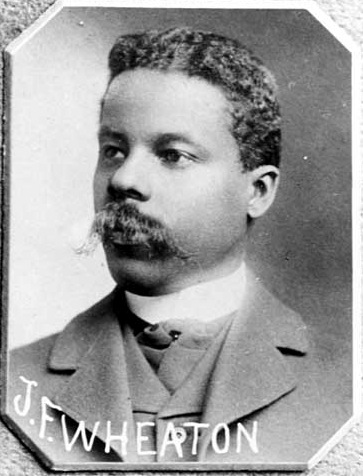John Francis Wheaton

Early years
Wheaton was born in Hagerstown, Maryland in 1866. His father, Jacob, was the first African American to vote in the state of Maryland after passage of the Fifteenth Amendment; a park in Hagerstown is named after him. Due to race relations in the area, Wheaton was required to go to the “colored” public elementary school. In order to complete the equivalent of high school, he attended Storer College, a historically black college in Harpers Ferry, West Virginia, graduating in 1882.
To pay his bills he worked as a shoeshiner, sold newspapers and did chores for professors. Meanwhile he became an active member of the Republican party, attending the state Republican conventions of 1887, 1889 and 1891. During the 1888 Presidential election, he was an active speaker on behalf of the eventually successful Republican candidate Benjamin Harrison at ward meetings. At age 22, Wheaton attended the 1888 Republican National Convention in Chicago as an alternate delegate from Maryland; he was the alternate for George L. Wellington.
Wheaton married Ella Chambers on June 6, 1889, and had two children, Layton J. and Frank P. He apprenticed law with a Hagerstown attorney before moving to Washington, D.C., where he attended Howard University. During that time, his connection to U.S Congressman Louis E. McComas helped him get work as a clerk in the United States Congress. He worked as a clerk for a few years, but the 1892 Presidential election, resulting in the election of Democrat Grover Cleveland, caused him to be terminated from his clerk position. At that time he decided to seriously pursue law. He passed the Maryland bar exam in 1892, but moved to Minnesota soon thereafter; the reasons for his move are unclear.
Life in Minnesota
Arriving in Minnesota in 1893, he attended the University of Minnesota Law School, becoming its first African American graduate, in 1894, and was elected class orator. He worked as a clerk in the state legislature and later as a deputy clerk for the Minneapolis municipal court system. He later opened a private law practice and became a major part of the local African American community, spearheading efforts to pass civil rights legislation. He also lobbied for permitting African American soldiers to volunteer for service in the Spanish–American War. At the time of his election to the Legislature, he had already successfully defended a murder suspect.
On November 8, 1898, Wheaton was elected to the Minnesota House of Representatives representing District 42. Newspapers of the time called the district “the most aristocratic portion of Minneapolis” in the state house; it included a large chunk of the metropolitan area from the Kenwood neighborhood to modern Eden Prairie, Edina and Excelsior. He had won the Republican nomination by a large margin, and would go on to win the general election by a significant margin as well in an area where only approximately 100 of the area’s over 40,000 residents were African Americans. While in office, he introduced and helped pass an 1899 civil rights statute that broadened existing Minnesota law and granted equal access for all races to saloons, which previously had been able to exclude customers based on race.
Wheaton twice represented Minnesota at the Republican National Convention. At the 1896 Republican National Convention, he was the alternate delegate to state senator Charles Alfred Pillsbury, and lobbied on behalf of eventual nominee William McKinley to African American delegates from the South. At the 1900 Republican state convention, he gave an impassioned speech where, as described by the Minneapolis Journal, he “hypnotize[d] the convention with oratory” in arguing for a spot in Minnesota’s national convention delegation for an African American. The Journal would report that “Before the delegates had time to pull up the lower jaws they dropped in amazement when they heard him nominate himself [. . .] Before the convention scarce knew what happened, Mr. Wheaton had won the prize.” He was selected as the alternate to Knute Nelson.
Later years
Wheaton’s attendance as a part of the Minnesota delegation at the 1900 Republican National Convention would be his last major work for the state of Minnesota. Before the state convention that preceded it, he had left for Chicago to be a co-founder of a life insurance company in that city. He later moved to New York City and by 1905 had set up his own law office in Manhattan with James Curtis, another African American attorney who had worked in Minnesota. The law firm was successful. Around the same time, Wheaton switched political parties and became a Democrat. Not long after his arrival, he was asked by Minnesota Governor John Albert Johnson to defend a former stenographer being tried for murder; Johnson and Wheaton knew each other from their time in the Minnesota Legislature.
Legacy
A contemporary political biography described Wheaton as one of “The Progressive Men of Minnesota.” His political rise ran counter to prevailing national trends. The collapse of Reconstruction and rise in Jim Crow laws caused serious regression in African American political power. Minnesota would not have another African American state legislator until 1973. The news of his death was reported in several Twin Cities newspapers; the Minneapolis Journal saluted “the spectacular career of J. Frank Wheaton, Negro lawyer.”